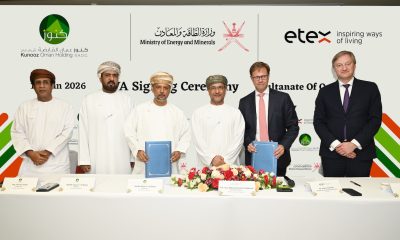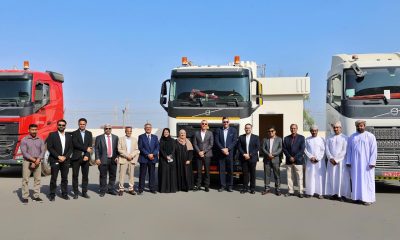Oman 2015
DIVERSIFYING INDUSTRIAL BASE
The industrial manufacturing has made great strides and remarkable growth with the government adopting successful strategies and policies.


HE Eng. Ahmed Bin Hassan Al-Dheeb
Undersecretary
Ministry of Commerce & Industry
The industrial manufacturing has made great strides and remarkable growth with the government adopting successful strategies and policies.
Since the beginning of the Renaissance, the government has paid special attention to the development of the industrial sector, considering it as one of the most effective sectors that can maintain continued growth and reduce the country’s dependence on oil revenues. Industrial statistics showed that GDP of the industrial manufacturing in 1975 was in the range of RO2 million only, which accounted for less than half a per cent (0. 3%) of the Sultanate’s GDP. But in 2013, industrial sector’s contribution to the GDP reached RO3267 million, accounting for 10.3 per cent of the Sultanate’s GDP. In addition, the Compounded Annual Growth Rate (CAGR) of the manufacturing industries share in the Sultanate’s GDP during the first three years of the 8th five-year Plan (2011-2013) reached 10.54 per cent.
Moreover, preliminary data results showed that the GDP share of other manufacturing industries (including refined petroleum products industry) reached RO1216.5 million at the end of June 2014, with an increase of 12.7 per cent compared to the same period a year earlier. In the field of exports, manufacturing industries achieved unprecedented growth compared to other sectors. Industrial exports rose from RO103.3 million in 1990 to RO3212 million in 2013. The chemicals manufacturing and chemical products sector came first with exports worth RO949 million, followed by refined petroleum products (RO696 million) and basic metallurgical manufacturing sector (RO661 million); and the compound annual growth rate of the total exports of the manufacturing industries over the first three years of the 8th five-year plan (2011-2013) reached 11.71 per cent.
REGULATORY ENVIRONMENT
The industrial sector is regulated by several local and GCC-wide laws and legislations. The Royal Decree No. 1/79 promulgating the Law for the Organization and Encouragement of Industry of 1978 and the amendments thereto, was the first regulatory framework for the industrial sector till the Law (System) of the Unified Industrial Organisation for the Gulf. Cooperation Council Countries promulgated by Decree No. 61/2008 was issued, to be the law governing the industrial sector and facilities contained therein, with regard to the licensing and registration of industrial facilities, determining benefits and incentives granted to them. Add to this several other laws and other related legislation related to industrial and related projects, foremost among which is the Common Customs Law of the GCC States implemented by Royal Decree No. 67/2003, Income Tax Law issued by Royal Decree No. 28/2009 and its executive regulation, and the Royal Decree no. 20/2015 issuing the AGCC States’ Standard Anti- Dumping Law and Compensatory and Preventive Measures. This law aims to enable GCC countries to take the necessary anti-dumping measures which may harm to any GCC industry. The Sultanate also signed a number of bilateral and joint industrial agreements within the GCC countries both at the regional and international levels, topmost among which is the Sultanate’s WTO membership treaty, the Free Trade Agreement with the Gulf Cooperation Council, the Free Trade Agreement under the Greater Arab Free Trade Area Agreement, the Free Trade Area Agreement with the United States, the free trade agreement between the GCC states and the Republic of Singapore, which took effect as of 1 January 2015, the Free Trade Agreement with the European Free Trade Association (EFTA).
INCENTIVES AND FACILITIES
The industrial sector is offered many incentives, topmost among which is the exemption from customs duties on imports of industrial projects, including machinery, equipment, spare parts, raw materials, semi-manufactured materials, packing and packaging materials required for industrial production throughout the period of the industrial establishment. In 2014, there were 182 ministerial decisions and 47 ministerial amendment decisions for customs exemptions, granted to industrial establishments. In addition, industrial projects are exempted from the profit tax and income tax on industrial enterprises. There is a statutory exemption from income tax for a period of five years from the commencement of commercial production, and can be renewed for a period of five or more years starting from the day following the expiry date of the statutory exemption.
-

 News2 months ago
News2 months agoAI Security Conference 2025 Hosted by Securado Highlights the Changing Cybersecurity Landscape
-

 Insurance2 months ago
Insurance2 months agoSupporting Community Wellness: Liva Insurance Sponsors Muscat Marathon 2026 with Free Health Checkups
-

 Interviews1 month ago
Interviews1 month agoEXCLUSIVE INTERVIEW: TLS Rebranding Marks Strategic Leap Toward Innovation, Sustainability & Growth
-

 Insurance1 month ago
Insurance1 month agoLiva Insurance Supports Community Wellness Through “Experience Oman – Muscat Marathon 2026”
-

 Investment3 weeks ago
Investment3 weeks agoLalan Inaugurates Its First Overseas Manufacturing Facility, Marking Sri Lanka’s First Investment in SOHAR Freezone
-

 Banking & Finance1 month ago
Banking & Finance1 month agoA New Platform for SME Growth: Oman Arab Bank Unveils Tumouhi
-

 News3 weeks ago
News3 weeks agoKunooz Oman Holding Partners with Belgian company Etex for Local Gypsum-Based Business Development
-

 Construction4 weeks ago
Construction4 weeks agoInternational Heavy Equipment hosts Open Day at its Refurbished Facility in Sohar Industrial Area






























You must be logged in to post a comment Login